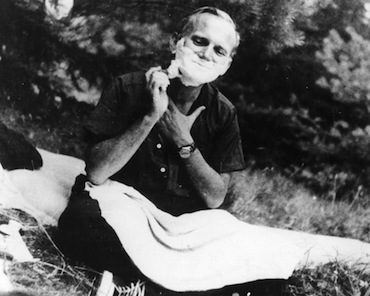Before beginning this immature polemic against the concept of heterosexuality, I need to preemptively acknowledge the two primary reactions the Internet will have, thereby negating their distractive powers. They are:
and
Now that we’ve shaken these from our system, I want your ears. The idea that a person is heterosexual is stupid. This claim is the beginning of what will surely take years to articulate, but we really must begin with something, and deconstruction sounds as fun as anything else.
A heterosexual is “a person who is sexually attracted to the opposite sex.” It’s a relatively hip word — as far as words go — recorded from 1920 but not in common use until 1960s, and though it’s supposed to denote a norm of human behavior (and please, don’t freak out over the terminology “norm” and “deviation,” it’s a statistical term, not a judgment on all your innermost feels) it accidentally denotes a perversion (and that term you can freak out over).
What perversion? A potently platonic perversion. Heterosexuality, understood as a sexual attraction for the opposite sex (as an attraction for women or men in general) makes the object of my attraction unreal. Woman as such does not exist outside of my mind. In reality, there are only particular women, just as there are only particular men, and every instance of sexual attraction is attraction to a particular person. There is no such thing as heterosexual marriage, for we marry a person, not an idea. I cannot wrap my arms around the opposite sex and ask if she could pitch in for the cost of the date. The idea of an attraction to “women in general” trades the particular person for the thought-construct of “woman in general,” a thought-construct that has no existence outside of your mind, a generalized group of the objective sexual attributes that we see in particular women, abstracted into a general idea.
 This is not to say that it is impossible to be attracted to the opposite sex as such. We may be, and in varying degrees. Indeed, I would argue that attraction to the opposite sex as such is the very modus operandi of pornography, which works to reduce a person to their sexual attributes. No, this is to say that to be attracted to the opposite sex as such is inadequate, immature and perverse. As the Polish, personalist, pre-popish Karol Wojtyla states in Love and Responsibility:
This is not to say that it is impossible to be attracted to the opposite sex as such. We may be, and in varying degrees. Indeed, I would argue that attraction to the opposite sex as such is the very modus operandi of pornography, which works to reduce a person to their sexual attributes. No, this is to say that to be attracted to the opposite sex as such is inadequate, immature and perverse. As the Polish, personalist, pre-popish Karol Wojtyla states in Love and Responsibility:
Moreover, the sexual urge in man and woman is not fully defined as an orientation towards the psychological and physiological attributes of the other sex as such. These do not and cannot exist in the abstract, but only in a concrete human being, a concrete man or woman. Inevitably, then, the sexual urge in a human being is always in the natural course of things directed towards another human being–this is the normal form it takes. If it is directed towards the sexual attributes as such this must be recognized as an impoverishment or even a perversion of the urge.
The very ascension of a relation to the generalized “opposite sex” as the primary essence of sexual attraction inverts the order of sexual relation. If the “sex” is primary, then the primary attractiveness of a person is not the whole person, not the person herself, not the unique unrepeatable “her” that stands out from the crowd and asserts herself lovely, no — if we are “attracted to the opposite sex,” then “the opposite sex” is the ideal. The idea of “woman” becomes the ideal object of our attraction, an ideal which particular women attempt to meet with varying success. The type guides our attraction — the person is simply an incidence of the type. If there is a difference between saying “I am attracted to women as such” and “I am attracted to the ideal woman,” I am not confident in it. Both are thought-constructs that mentally generalize the attributes of particular women into an single, general idea.
And is this not apparent in our abysmal sexual culture? Consider, for instance, popular advertising’s objectification of women into various disembodied appendages. If we understood that sexual attraction is always an attraction to a person, surely we would be a little repulsed at the direct effort to deny the existence of the person in favor of the general attribute of breasts? But this is the mode, for most men are “heterosexual,” attracted to the opposite sex in general, and thus a depersonalized appendage as a selling point makes perfect sense, as does all pornography.

The emphasis on the opposite sex as the norm of sexual attraction and not the person seems to be precisely what the LGBT movement reacts against. Catholics, in reaction to the godawful philosophical inadequacy of LGBT folks, tend to ignore what is a true insight into this problem. Surely the work of modern gender theory is a work of fragmentation, of reducing the “norm” to a number of possible norms? Their movement is a movement away from the platonic to the particular, from the thought-construct “opposite sex” as the normative object of attraction to more specific objects. Of course, the LGBT movement has failed entirely in this venture, making the problem worse and everyone miserable, because instead of rooting sexual attraction in the person, calling it what it oh-so-apparently is, an attraction between persons, they have created a veritable swamp of thought-constructs, an ever-growing system of impersonal labels that create an illusion of personality. Because the world is cool now, a person can be a sapiosexual, sexually attracted to intelligence, but since intelligence has no existence outside of particular people, such an orientation is rooted in unreality, in avoiding the person. And again, even if we admit that it is not intelligence itself we are sexually attracted to, but intelligence in people, our object of attraction is still primarily the platonic ideal of intelligence — the only difference is now a particular person is a better or worse manifestation of this ideal.
Now the only difference between boring homosexuals and boring heterosexuals is that, while both label themselves as fundamentally attracted to thought-constructs, the latter — especially amongst the Christian crowd — finds comfort in being the “right type” of sexuality. Thus I have experienced the particularly odd phenomenon that Christian men who watch pornography finding some justification in watching heterosexual pornography, as if to say “my attraction to a pixelated reduction of a person is more normal than your gay attraction to a pixelated reduction of a human person.” In the same way this justification misses the whole point, I believe it misses the whole point to take comfort in “being heterosexual” if this heterosexuality is attraction to the opposite sex as such. Indeed, Karol Wojtyla says something particularly surprising in Love and Responsibility, and I think it it worth a glance.
Directly after he argues that “if [attraction] is directed towards the sexual attributes as such this must be recognized as an impoverishment or even a perversion of the urge,” he says: “If it is directed towards the sexual attributes of a person of the same sex we speak of a homosexual deviation.” Here the “heterosexual” and the “homosexual” are all but equated as partners in equal lameness. And indeed, this is precisely the position the term “heterosexual” has taken in modern gender theory, as one “option” of attraction amongst many. I do not think this is merely the result of the relativizing, normalizing impulse of our cultural architects. It is also inherent to the fact that heterosexuality indicates a particular “type” of sexuality relating to a particular “type” of object. The height of sexual liberation is to be offered a whole host of ghostly abstractions — a sex, both sexes, intelligence — towards which to orientate our erections. This is followed by a list of labels — hetero, homo, bi, pan, omni, sapio, a, inter, trans, etcetera — that concretize these pseudo-relations of person-to-impersonal into summations of who-we-are, so I may “I am a heterosexual” and believe this is the truth about myself, even though it is founded — as the entire system is founded — on the lie that sexual attraction should be anything but attraction to a particular person.
What’s needed to break the mindless malaise of labeled, platonic sexuality is truly personalist description, one that begins at the fact that sexual attraction is properly oriented to a person. Such a description has the capacity to restore our broken culture, for the person — transcending all labels, thought-constructs, disintegrations and unrealities in being a particular, unique “him” or “her” — can only be understood through and with his or her body. Only by relating to the body and its apparent meaning do we relate to the entire person, who is a synthesis of subjectiveness and objectiveness, of interiority and exteriority, of body and soul. If our understanding of sexuality was rooted in the person, it would be rooted in the whole truth about ourselves, which includes the body. As long as we cling to “heterosexuality,” we root sexuality in reference to mental constructs and ever-shifting ideals.
In summary, the almighty sexual system is stupid, and I hereby take my leave.












